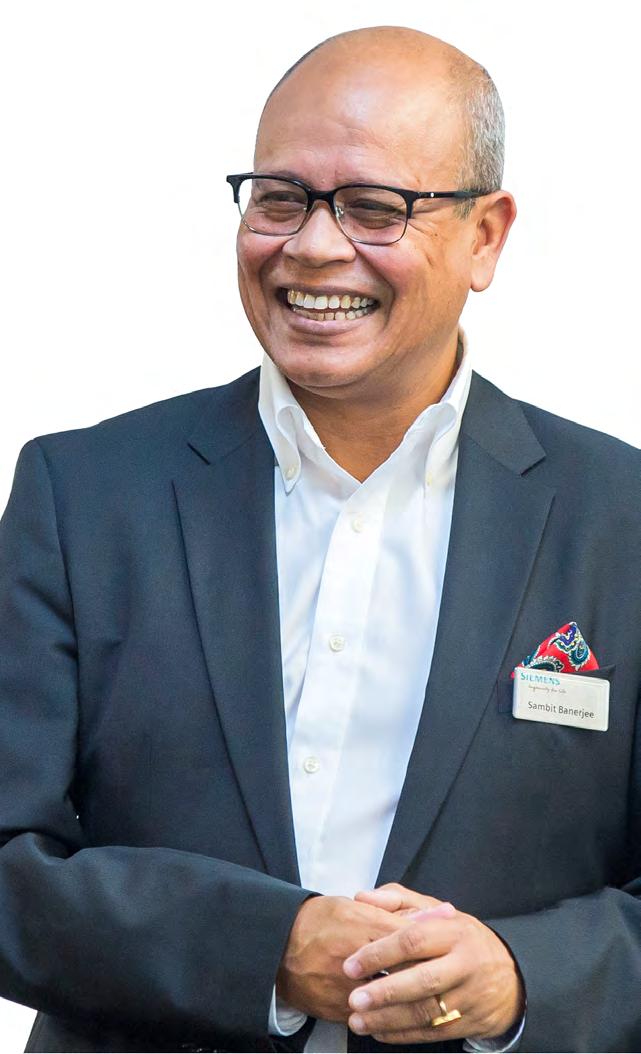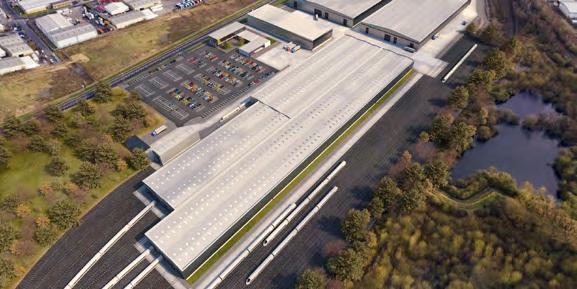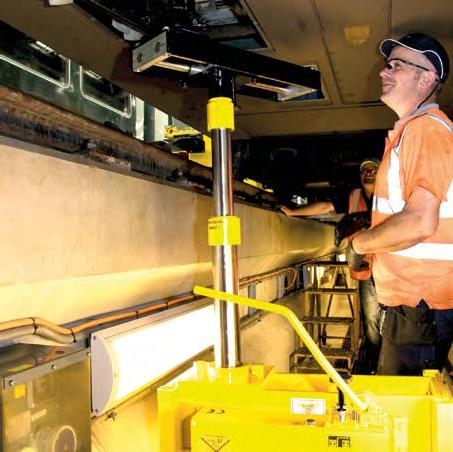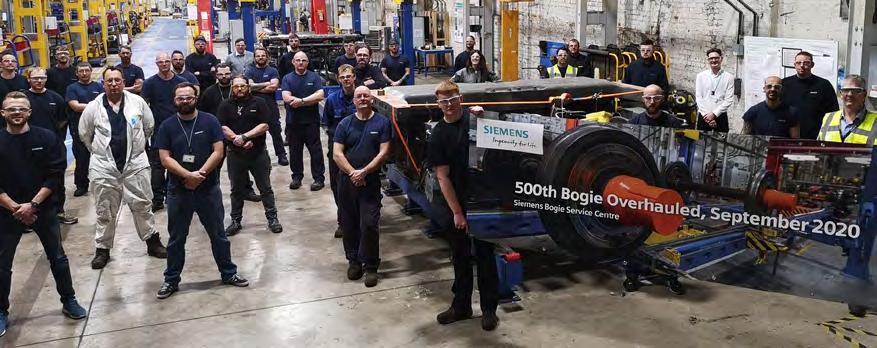
8 minute read
The sweetness of Siemens Mobility
Sambit Banerjee, MD of the multinational company’s rolling stock and customer services business in the UK, on his long innings and a corker of a future
“The more you bat,” he said, “the more you enjoy the sound of the ball hitting the bat, that sweetness. Working at Siemens is very much like that. It feels good to have been here for so long and the more time I am here the better I feel. It’s a great company to work for, a fair company, and one that has opened up opportunities for me.
“I am enjoying my job more than ever before and I look at work differently now. Now it is time for me to give a lot back to this organisation and its people. If I can be of any help to colleagues in work areas, in coaching, guidance and mentoring, I am more than happy to do so and share the experience that I have acquired on this journey with them.”
Beginnings Sambit’s journey commenced when the chartered accountant joined Siemens India at Kolkata in 1992. A brief intermission in 2001 saw him work for The Times of India group as Vice President of Finance, then Chief Financial Officer of a joint venture between The Times of India and BBC Publications, before a return to Siemens in 2005. He has enjoyed two spells in Munich for the business and, in 2006, moved to the UK, with responsibility for Siemens’ IT business for North West Europe and, after that, into the logistics and airports business. His move into rail came in 2013, when he joined Siemens Mobility as Finance Director.
Having travelled the globe, his sights are now firmly fixed on an inland port town in the East Riding of Yorkshire – Goole. Siemens Mobility’s ambitious plans will see a new £200m train manufacturing plant located there to manufacture and commission new generation trains, which is set to create up to 700 skilled jobs at its peak, plus another 250 jobs in construction. The plant is due to open in 2023.
Sambit is keen to stress that Siemens is not in the business of merely opening factories. Rather, it creates technology centres and technology parks and, as a result of these ‘localisation’ projects, transforms communities.
Sambit explained: “This is our dream project, we have big plans, and this will have a big, positive impact on the town and its people. Internally we started discussing our plans for Goole in 2013 so it has been a long journey, but we have planned this journey for the next 50 years.
“We want to play our part in the post-Brexit UK and our goal is to create a very British manufacturing location in Goole. We’ve worked closely with government and we are one of the few companies committed to developing a large-scale technology park here.
“We are creating local employment and our apprentices will mostly come from that area. Young men and women from schools and colleges in the town will be trained by us and they will grow and develop into future leaders. We want to create stable, long-term employment for the people of the UK.”
Sambit firmly believes that creating local added value will also lead to the development of the supply chain, with new business established in the region, while those 700 jobs created by Siemens Mobility will also be multiplied with the creation of another potential 1,700 jobs in the supply chain. Siemens Mobility is also encouraging other businesses to co-locate in East Yorkshire with them, resulting in transformational socio-economic benefits that will reap rewards for future generations.
“And I will be a very proud man as a result. Bringing about this change will be very satisfying,” he added. The 50-year plan also factors in some more immediate developments for Siemens Mobility. Currently, many Heating, Ventilation and Air Conditioning (HVAC) repair works are carried out in Germany. However, in 2021 these will be delivered in Leeds, where Siemens Mobility’s traction drive business is located, while that Leeds facility will itself move to Goole in 2022 ahead of further expansion.
Sambit added: “We want to do this ourselves and take control of as many elements of trains in the UK as we can.”
Siemens Mobility’s commitment to UK industry and rail is also clearly signalled a mere 50 miles from Goole where in Lincoln its Bogie

Keeping you on the right track
Specialists in bespoke hydraulic lifting equipment for the rail industry A well established 100% British company, with safety and quality being our top priorities Quality approved to BS EN ISO9001:2015 We will be pleased to quote, design and build hydraulic lifting equipment to suit your individual needs
Proud suppliers to Siemens
Majorlift Hydraulic Equipment Ltd.
Arnolds Field Estate, Wickwar,
Wotton-Under-Edge GL12 8JD Specialists in bespoke hydraulic lifting (+44) (0)1454 299299 equipment for the rail industry www.majorlift.com A well established 100% British company, with safety and quality railbusinessdaily.com being our number one priority Quality approved to BS EN

Service Centre, established in 2018 following an £8 million investment and employing 62 people including 44 skilled technicians, has just celebrated its 500th bogie overhaul for the Siemens UK fleet of trains – a milestone that barely scratches the surface of what is possible in this piece of the Siemens jigsaw. “We have capacity now to overhaul 650 bogies a year, but we can increase that capacity and reach closer to 1,000. We’ve just started servicing wheelsets as well. There’s potential for further expansion that could see bogies assembled in the town and that will be great news.”
Decarbonisation plans Siemens Mobility is now working on decarbonisation plans that will serve the rail market for the next three decades and beyond. Internally, Siemens has a target to be carbon neutral by 2030, while its work around alternative propulsion and the development of batteryelectric bi-mode and hydrogen-electric bi-mode eco-friendly trains is music to the ears of the Government and the devolved parliaments of the UK looking to hit their own 2050 net zero targets.
Sambit explained: “We’re working intensively, along with Siemens Energy, on providing solutions, as you’d expect. So that’s not just looking at trains but providing end-to-end capability, with the infrastructure for the generation, storage and distribution of hydrogen. This includes developing new innovations involving storing hydrogen as ammonia, enabling much greater densities to be stored in a given space and then being converted into hydrogen for fuelling. “Then there is also a focus on battery trains, given that there will be a requirement in the next ten years for some non-electrified routes to use battery technology.” Siemens Mobility has a battery train in operation in Austria with OBB and are now in the process of delivering 20 Mireo Plus B battery bi-mode trains for the German regional transport authority Landesanstalt Schienenfahrzeuge Baden-Württemberg. In addition, a partnership was formed with Ballard in 2018 to develop the next generation of fuel cells for rail and, in a new partnership with Deutsche Bahn in Germany, those fuels cells will be used to develop a prototype hydrogen train and refuelling system. Sambit added: “If we can give solutions to the Government around zero carbon it’s a win-win for all of us, and that’s the space we’re working in right now.”
These are as exciting times as any in Siemens’ long history. Siemens Mobility has supplied over 3,000 vehicles to the UK that, with the exception of CAF/Siemens Class 332/333 fleets, have all been supplied since 2003. The overwhelming majority of these trains are also maintained by Siemens at depots in Southampton, Three Bridges, Hornsey, Northampton, Manchester and York.
Drawing on experience Mid-life fleets comprising Class 185, Class 350, Class 380 and Class 444/450 trains are undergoing digital upgrades with the capability to send data back to Siemens Mobility’s control centre to enable preventative and predictive maintenance, bringing with it increased reliability. Predicting the future and increasing the number of timely interventions will reduce the lifecycle costs of trains.
In addition to bringing plans for Goole and Lincoln to fruition, Sambit is also busy ensuring that Siemens Mobility delivers high-quality trains for London Underground’s Piccadilly line.
The impact of COVID-19 also required Sambit to draw on his decades of experience, and, with all depots remaining open as the business played its part in keeping Britain and its essential people, services and medical supplies moving, he quickly saw to it that staff had the required health, safety and wellbeing support in place. It’s just as well that he’s losing none of his enthusiasm.
He said: “We have a tremendous work culture throughout Siemens, based on what we call our ownership culture around instilling empathy, safety and wellbeing.
“Looking after people is very important to me and to all of us here. This is not a rail business; this is a people business. If I look after my people, they will take care of me.
“We have a big role to play and a big responsibility that goes with delivering safe trains, every day. Keeping the British public safe while travelling will always remain core.
“The company is rock solid, that’s our strength. As for the future, there will be a balance of innovation and carbon neutrality projects with increasing benefits to our customers. Siemens is such a brilliant company with brilliant minds and we can come up with a lot of innovations. But what is the point of innovation if it doesn’t find its way to the customer and that doesn’t positively impact life cycle cost management? We’ll make sure we do that.
“And we do all of this while also considering how we can transform communities and change lives forever. This is our legacy and one I’m proud to be part of.”











